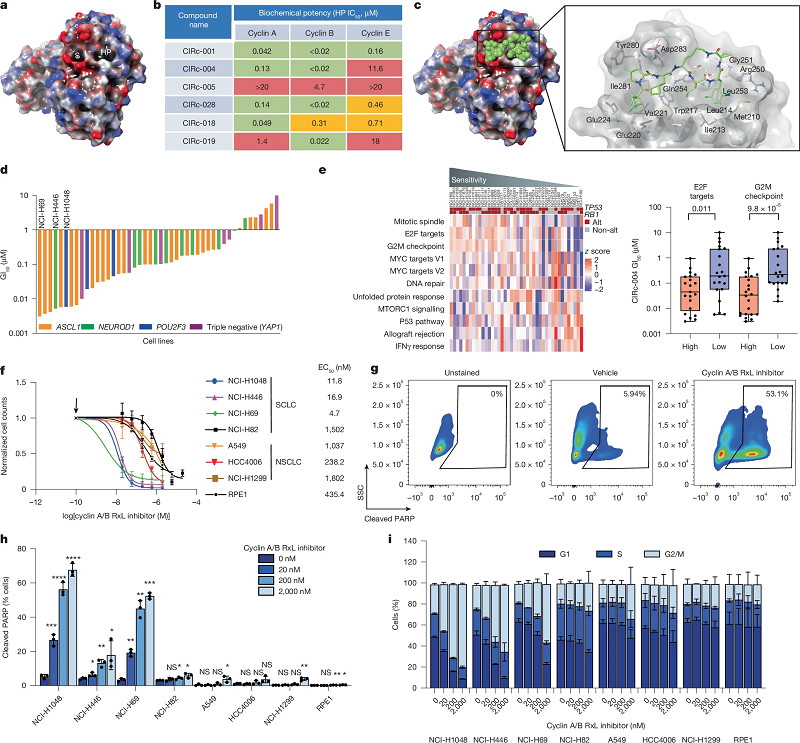Unlocking Cancer's Secrets: The Revolutionary Journey of New Cell Cycle Inhibitors
Cancer remains a major threat to human health. Despite continuous advances in medical technology, the complexity and diversity of cancers present numerous challenges in treatment. In recent years, as research deepens into the biological mechanisms of cancer, scientists have gradually discovered that abnormal cell cycle regulation is a key factor in the development and progression of cancer.
The cell cycle, which describes the entire process from the end of one cell division to the next, is meticulously regulated by multiple proteins. Among these, abnormal activation of cyclins and cyclin-dependent kinases (CDKs) often leads to excessive cell proliferation and cancer. Therefore, the development of new drugs targeting cell cycle regulation has become a cutting-edge focus in cancer treatment.
Recently, in a research report published in Nature titled "Targeting G1 S-checkpoint-compromised cancers with cyclin A/B RxL inhibitors", scientists from Harvard Medical School and other institutions have developed a novel class of cell cycle inhibitors, specifically targeting the RxL motifs of cyclins A and B.
Cyclin A and B play a key role in cell cycle regulation, modulating cell proliferation and division by interacting with specific substrate proteins. In certain cancer types, such as small cell lung cancer (SCLC), abnormally elevated cyclin A and B activity leads to excessive cell proliferation and tumor formation. Therefore, inhibiting the activity of cyclins A and B holds promise as an effective cancer treatment strategy.
In this study, the researchers first designed and synthesized a series of cell-permeable, orally bioavailable macrocyclic peptide inhibitors that specifically bind to the RxL motifs of cyclins A and B, thereby blocking their interactions with substrate proteins. The experimental subjects included various small cell lung cancer cell lines (such as NCI-H69 and NCI-H1048) and normal cell lines (such as WI-38 fibroblasts). The experimental workflow encompassed cell proliferation assays, flow cytometry analysis, immunoblotting, gene editing screening, and animal model studies.

The results indicate that novel cyclin A/B RxL inhibitors, such as CIRc-004, exhibit significant antiproliferative activity in multiple small cell lung cancer cell lines, while exhibiting minimal effects on normal cell lines, demonstrating their high selectivity and low toxicity. Further mechanistic investigations revealed that CIRc-004 blocks the interaction between cyclin A and E2F1, leading to excessive E2F1 activity and consequently cell cycle arrest and apoptosis. The researchers also noted that CIRc-004 activates the spindle assembly checkpoint (SAC) by blocking the interaction between cyclin B and MYT1, thereby inducing mitotic cell death. In animal model, orally administered CIRc-014 demonstrated potent antitumor activity in chemotherapy-resistant small cell lung cancer patient-derived xenograft (PDX) models, with no significant toxicity observed.
This study highlights the inhibitor s excellent cell permeability and oral bioavailability, as well as its significant antitumor activity in multiple small cell lung cancer cell lines and animal models. This inhibitor achieves a dual-target effect on tumor cells by simultaneously blocking the activity of both cyclins A and B. This discovery is expected to provide new insights and potential therapeutic strategies for the treatment of intractable cancers such as small cell lung cancer.
Reference:
- Singh, S., Gleason, C.E., Fang, M. et al. Targeting G1 S-checkpoint-compromised cancers with cyclin A/B RxL inhibitors. Nature (2025).

Your email address will not be published. Required fields are marked *